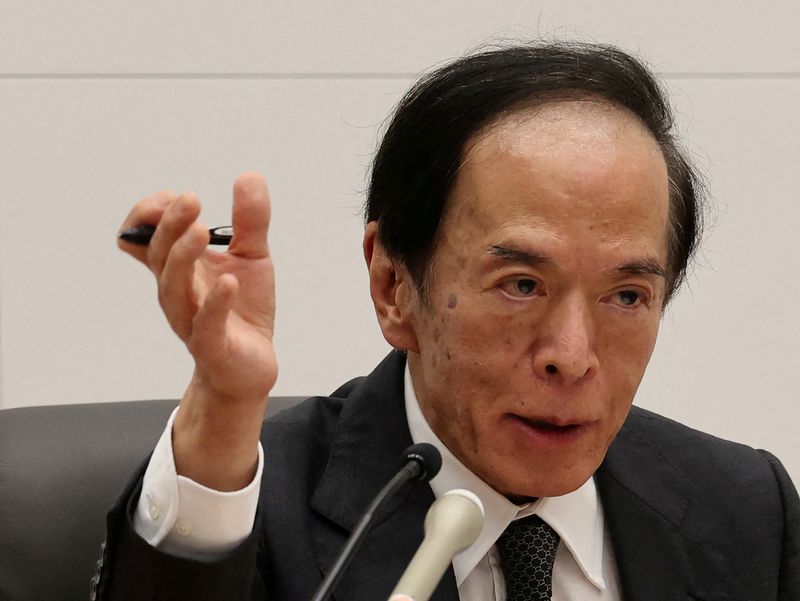(Reuters) -The Bank of Japan kept interest rates steady on Friday and revised up its assessment on consumption, signalling its confidence a solid economic recovery will allow the central bank to raise interest rates again in coming months.
As widely expected, the BOJ kept short-term interest rates steady at 0.25% at a two-day meeting that ended on Friday.
Following are excerpts from BOJ Governor Kazuo Ueda's comments at his post-meeting news conference, which was conducted in Japanese, as translated by Reuters:
INTEREST RATES
"Our decision on monetary policy will depend on economic, price and financial developments at the time. Japan's real interest rates remain extremely low. If our economic and price forecasts are achieved, we will raise interest rates and adjust the degree of monetary support accordingly."
ECONOMIC OUTLOOK
"The outlook for overseas economic development is highly uncertain. Markets remain unstable. We need to scrutinise such developments carefully for the time being."
PRICE TARGET
"We will carefully examine how such risks affect our outlook and the likelihood of achieving our price target."
EXCHANGE RATE
"As for recent exchange-rate developments, the risk of an inflation overshoot from rising import prices has diminished significantly. As such, we have some time to decide on policy." NOMINAL WAGES
"Wages must rise in a way that is consistent with sustainably achievement of our price target. Nominal wages are rising, reflecting strong wage negotiation outcome and pushing up income. Bonuses are rising. We expect wages to keep rising."
ON WHETHER MARKETS HAVE STABILISED "It's hard to say how long it will take to determine (whether markets have stabilised). We don't have a specific deadline. But one factor we'd like to look at is whether the U.S. economy will achieve a soft landing, or whether the slowdown could be a bit more severe."
WAGE NEGOTIATIONS
"We are hopeful that next year's wage negotiations will be strong. But we must scrutinise how overseas economic developments could affect corporate activity and profits."
BROAD WAGE HIKES
"Wage hikes are broadening, but some smaller firms are struggling. We want to carefully scrutinise whether wage hikes will broaden." JAPAN'S ECONOMY ON TRACK "Looking at consumption and other data, Japan's economy is on track and moving in line with our forecasts. We could have even upgraded our view on inflation expectations, based on domestic data. But uncertainty on the U.S. economic outlook has heightened. That is offsetting some of our optimism on inflation expectations." NEUTRAL INTEREST RATE
"So far, we have yet to narrow down the estimated level of Japan's neutral rate ... We need to deepen analyses including the impact of our two rate hikes this year."
BOTTOM RANGE OF NEUTRAL RATES "We don't have a specific level in mind when we talk about the estimated bottom range of Japan's neutral rate. We won't necessarily go slow when we approach that level. But we will be particularly careful of the impact of our past rate hikes." ON AUGUST INFLATION "It came a bit stronger than expected. Some of it is due to the weak yen effect. Including other one-off factors, quite a bit of these factors will dissipate. On the other hand, service prices are rising in line with our forecast as wages rise. That is putting upward pressure on inflation. We need to take all of these into account comprehensively. We also need to take into account overseas uncertainties and market moves." KEY FACTORS BOJ WILL LOOK OUT FOR IN SETTING POLICY
"One is whether wages will rise steadily, including the impact of expected rises in the minimum wage. Another factor is whether companies will keep passing on rising (labour) costs to services prices. The outcome of next year's wage negotiations is key, as well as whether consumption will remain firm." POTENTIAL RISK OF BOJ HIKING RATES

"In general, each country sets monetary policy to achieve economic and price stability. As such, there could be cases where the monetary policy cycle could differ from one country to another. It's clear the U.S. has entered a rate-cut cycle. If that leads to the U.S. economy achieving a soft landing, the negative impact on Japan's economy won't be large. But if the U.S. economy faces a more severe adjustment, we might need to alter that view."
ON WHETHER BOJ WOULD RULE OUT A RATE HIKE IN OCTOBER"I won't comment in advance whether we will change monetary policy or not in future policy meetings." U.S. SOFT LANDING AS MAIN SCENARIO "We still see U.S. soft landing as our main scenario. But U.S. data since early August has been somewhat weak, so risks have heightened somewhat." UNCERTAINTY OVER GLOBAL ECONOMIC OUTLOOK "As for Japan's economy, it's moving in line with our forecast. But the global economic outlook is uncertain, mainly that of the United States. We've also seen some market volatility. The outlook is uncertain. As such, it's not as if the likelihood (of achieving our price target) has heightened sharply, and warranted raising rates immediately." ON WHETHER BOJ COULD RAISE RATES BY YEAR-END "That decision continues to be data-dependent. We need to look not just at domestic data, but developments in the U.S. economy. We've been scrutinising these already, but need to pay even more attention and make a comprehensive decision."